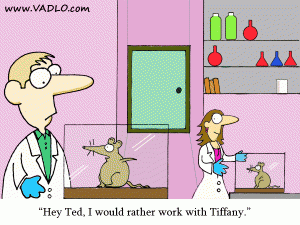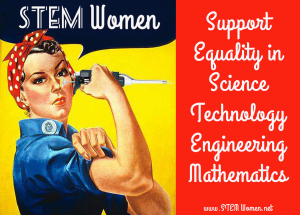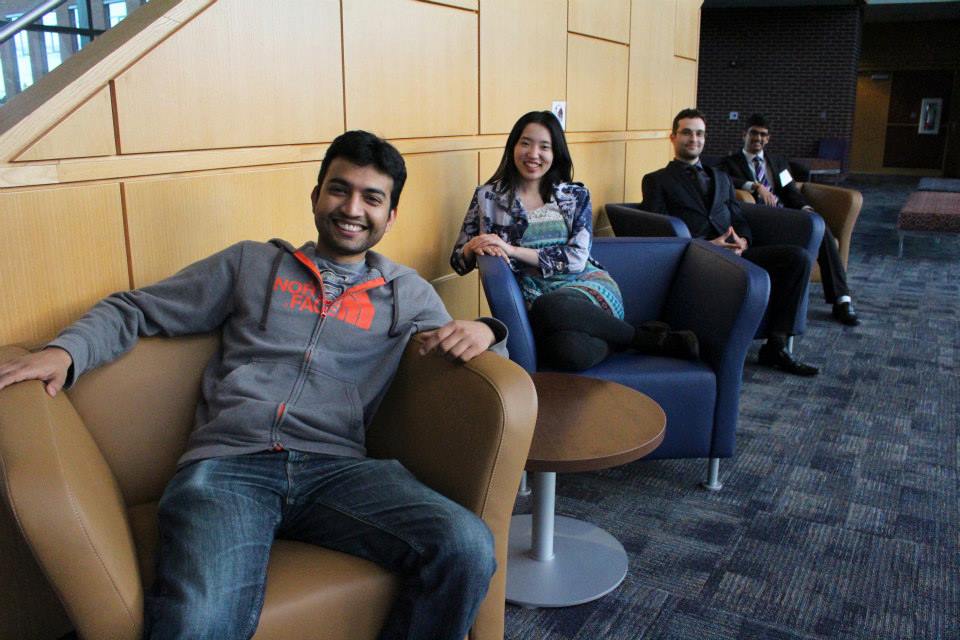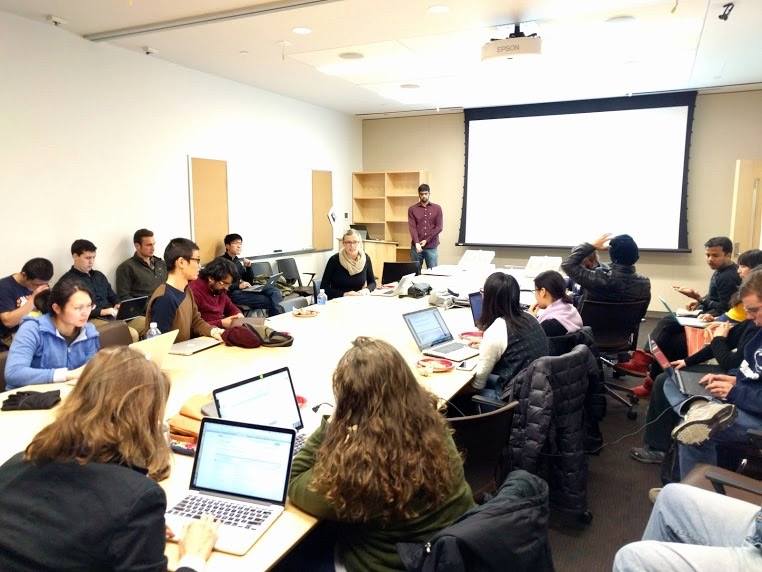By
For centuries, discrimination, sexism and inequity have plagued STEM fields and has hindered many innovative spaces. Despite these issues, women have remained in the forefront of scientific progress. Women have achieved or surpassed equivalence with men in most academic fields, yet continue to be outnumbered in many STEM areas. I have learned communication is the sole enemy of ignorance. Therefore, I seek to bring forward unspoken issues and point of views so to break the chains of silence by celebrating openness, ideas, and experiences. For this piece, I spoke with several female students at various stages in their Ph.D processes to get their first-hand perspective as a female scientist at Penn State. I asked them several questions and below I compiled a collage of responses in an effort to better foster communication and openness in the STEM areas.

Meet:
Ericka D. Reed
What is your major and why?
Biochemistry and Molecular Biology; I want to pursue a career in infectious disease research
What year are you? 2nd year
I study how quorum sensing, cell-to-cell communication among bacteria, impacts host colonization using the Hawaiian bobtail squid and its symbiont Vibrio fischeri as a model system.
Adwitia Dey (Tia)
What is your major and why? Physiology-it allows me to study a wide array of biological processes.
What year are you? 3rd
My current research focuses on a particular immune cell (macrophages) and how it’s activation with a receptor (Ron) influences chronic inflammation in the CNS. Ron activates anti-inflammatory macrophages and plays a protective role in inflammation. We study CNS inflammation in mice with two methodological approaches: 1.Diet-induced atherosclerosis and obesity models and 2. Immunization induced Multiple Sclerosis. Ron seemingly has a protective role in attenuating CNS inflammation, thus my ongoing research endeavors to identify a mechanism underlying this observed protective phenotype.
 Paige Chandler
Paige Chandler
What is your major and why? I’m a doctoral student in the Physiology program. The Physiology program at Penn State offers flexibility in terms of research areas that you can explore.
What year are you? I’m a 5th year.
My lab is interested in skeletal muscle growth control from the perspective of ribosome biogenesis. We are studying the role of degradation pathways, primarily the ubiquitin proteasome system, in regulating skeletal muscle growth. We use both cell based and animal models of hypertrophy and atrophy to answer our questions. The goal is to better understand how the proteasome contributes to skeletal muscle wasting in an attempt to provide better therapeutic targets and strategies for people suffering from muscle loss.
Jennifer Legault
What is your major and why? I’m in the neuroscience program because I’m fascinated by the possible effects of training (especially second language training) on the brain.
What year are you? I’m a 4th-year student.
I use a multimodal neuroimaging approach to examine the various effects of second language training on the brain. Specifically, I examine whether the context in which a person learns a second language has different effects on the gray matter structure of the brain with training. Furthermore, I examine whether these gray matter changes occur in regions that are functionally active during language control tasks. I then examine whether these brain changes are different for non-linguistic training as a way to glimpse what may be unique in the brain about learning second language vocabulary.
Do you feel like your work environment is male–dominated? Do you feel the workspace tends to have aggressive, transactional cultures?

“Luckily, I think my work environment is pretty gender equal, however, that’s perhaps one of the reasons that I gravitated towards it in the first place. I don’t think I would feel as comfortable working in an environment that was aggressive or demeaning towards women or any other demographic.”
“My work environment is not male-dominated. In fact, most of my experiences in research have involved women. Additionally, I don’t think I have had many experiences with aggressive peers.”
“At this stage/place of my career, I do not feel as though it is male dominated, however coming from biochemistry labs it was predominantly male. Depends on the area of research?”
“Not really. My PI actually seeks to create a balanced lab. I even recall an instance where he asked our opinion regarding the gender balance in the lab. He seems to be a major advocate for women and minorities in science.”
What’s your advice to little girls everywhere as a woman in STEM?

“I would tell young girls to be confident. As women, and especially as women of color, we feel as though we’re invading spaces that weren’t necessarily meant for us. So I would say to trust your brain and be confident.”
“Take any criticism as a challenge to do better, try to learn from it and even if it is completely baseless, use it as a motivational tool to work harder.”
“Don’t be intimidated by the “hard’ fields, i.e. engineering, hard core biochemistry, computer programming, etc. We are just as capable of excelling in these areas as men are.”
How do you think women can overcome the perpetuated stereotypes in STEM?

“It is impossible for women to change the opinions/stereotypes people might have. We’re not less prepared, and we’re not less qualified than our male counterparts. I’m not exactly sure how we can overcome perpetuated stereotypes. Can you really penalize men or women who maintain and vocalize detrimental opinions? I’m specifically thinking about when Tim Hunt told journalists in South Korea that “three things happen when they are in the lab … You fall in love with them, they fall in love with you and when you criticize them, they cry.” I’ve also worked with a woman PI who constantly disparaged women as being “bitchy” and hard to work with; she even went as far to hire a Lab tech who is male because the lab “needed more testosterone”. And the man she hired was the most emotionally unstable person I had ever met. But what is the recourse for situations like these? I think as soon as more people become intolerant to ideas/opinions like these, then maybe people will change the way they think.”
“By continuing to do great research. If life has taught me anything, it’s that people will form their opinions of you regardless of what you do. Instead of proving them right or wrong, I’d rather focus on contributing something worthwhile to my field and letting the work speak for itself.”
What encouraged you as a woman to study STEM?

“I always wanted to be a doctor growing up, yet when I moved to the U.S. in 4th grade and had to learn to read and write in English (I’m a French Canadian), I was worried that I might not be able to make it. In fifth grade, my English scores had improved enough to not need English as a Second Language classes, but I was still hesitant. Luckily, my teacher, Mrs. Gray really encouraged me by telling me that I could of course succeed, so long as I put in the work, dedication, and passion. There was just this high level of complete faith in my ability on her part that I believed her, and I think that made a big difference. Also, my parents never made me feel like I couldn’t do something because I was a girl.”
“I never really understood or saw the world through gender lenses, so I ventured into studying STEM to purse what I enjoyed.”
Do women in STEM need more role models?

“Women in STEM do need more role models. Sometimes it is hard to visualize yourself in a career when you don’t see people who look like you or are culturally similar to you. However, we need to realize that if we persevere, we will represent what we hope to see. Originally I decided to join the Physiology program at Penn State because of the flexibility to study in different fields like biochemistry, nutrition, etc. I was surprised to see so many women in leadership positions. I saw many women who were PIs, Chairs of programs/departments, well-funded, and most importantly, respected. However, one thing that I think Penn State could do is try to recruit more racially and culturally diverse women.”
“I wouldn’t say that we need more role models per se, because I think there’s already a great number of amazing people to look up to. I think we need to increase the visibility of current role models, especially those who stand up to injustices, those who persevere, and those who inspire others.”
“Yes, but we need more women who aren’t afraid to be themselves. It seems that women in STEM fields feel the need to assume a more masculine demeanor to be taken seriously, which plays into the stereotype that women are inferior or don’t belong. I would like to see a researcher showing the world she can handle her business in heels as well as any man in flats.”
What are your thoughts on the factors affecting women entering the field and the high rate of attrition?
“Many women avoid certain career paths due to the constant societal pressure of starting a family. I remember attending a seminar once and a woman speaker was talking about how she sacrificed accepting a faculty position at an R1 university so that she could work at a smaller R3 university. She advised all the women in the audience that it’s okay to make that same decision if work-life balance is important to them. I personally have never felt pressure to start a family, so I don’t think about that when I’m planning major decisions in my life. But I see my peers around me who do want to start families. I would say that it truly affects how they navigate graduate school and their personal relationships.”
Can you spotlight some of the sexism that many women in STEM fields encounter daily?

“Although I’ve been incredibly fortunate that I haven’t encountered much overt sexism in my workplace myself, I do have many friends who have. I’ve know many graduate students who do not even feel comfortable being in a room with their male colleagues alone because of blatant harassment. Furthermore, some of my female colleagues were instructed to do menial tasks (such as cleaning lab spaces) that male colleagues were not expected to contribute to. Outside of the lab, or in general, I definitely did grow up thinking that I needed to be more masculine in order to gain respect. I used to think that dressing in a feminine manner, or showing any kind of emotion was somehow less professional (I have since changed my views). I have female friends who were advised to not wear clothes that were too tight or too loose, to wear more makeup or less makeup, and it fostered this idea that somehow women were more judged by their appearance than their work. What’s more is that I’ve spoken to some female professors and many stated that they were expected to be on more committees than their male counterparts, which took away from valuable research and grant writing time. Importantly, some of my male friends also suffered from sexism where they were told to “man up” or it was assumed that they should know everything about coding and programming (or some other field) simply because they were male. Sexism does not benefit anyone.”
What are some adversities you have faced as a female student?

“I was told in undergrad once by my virology professor that the only diploma I’d see if I am to graduate with my Bachelors of Science is a marriage diploma. He believed I couldn’t maintain research (which I started early in undergrad) and courses, in other words women cannot manage multiple aspects of life well and that’s why they chose marriage and family over PhD careers so they can focus on one thing.”
“Learning to swallow my emotions and hide my frustration (I was actually told I need to work on hiding my frustration). My advisor always says “No one cares how you feel. They care how you think”. I understand his goal is to get me to stay focused on the science. However, it is sometimes challenging for me to not become emotionally involved in something I’m so invested in.”
What do you believe are the challenges women face in maintaining a work-life balance in a STEM field after having children?

“The perception that only mothers can take time off or should instead of fathers.”
“To begin with, I think there’s a great disparity in the amount of maternity leave that is available to women, and often times it is only available for a short period of time. This problem is exacerbated by the fact that often, spouses do not get paternity leave, which means that one parent (often the birthmother) will have to bear the brunt of the work, and many times this is even if there were complications during pregnancy. For those interested in careers in academia, sometimes the tenure track clock does not stop to accommodate childbirth. All of this may be perceived as an encouragement to have fewer (if any) children. Some may think that women deciding to have children have somehow de-prioritized their work. To the contrary, the women in academia that I’ve spoken to about work-life balance after having children actually state that they’ve become more effective workers and have become better at maintaining this balance than before they had children, so that’s great to hear. If we can work together to help dispose of some negative (and often false) connotations of having a family (in regards to both females and males), I think we could significantly improve the current situation. Further, I think it would help to dissuade gender-specific parenting assumptions (e.g. assuming the mother should be the primary caregiver and the father should be the primary financial provider).”
How can Penn State serve the need of women in graduate school better?
“By doing what you are with this writing piece, sharing stories of success and by reading this, the community within can motivate its surrounding.”















 ask for it and hand it out – At some point, you’re going to need help. Whether that be with a lab protocol, having someone read over something you’ve written, having a labmate take care of your plants/animals/cells while you’re away, or analyzing your data, it’s going to happen. Science isn’t about individual pursuit, so building trusting relationships with your colleagues where you reciprocate help early on will help you be successful throughout your career.
ask for it and hand it out – At some point, you’re going to need help. Whether that be with a lab protocol, having someone read over something you’ve written, having a labmate take care of your plants/animals/cells while you’re away, or analyzing your data, it’s going to happen. Science isn’t about individual pursuit, so building trusting relationships with your colleagues where you reciprocate help early on will help you be successful throughout your career.









